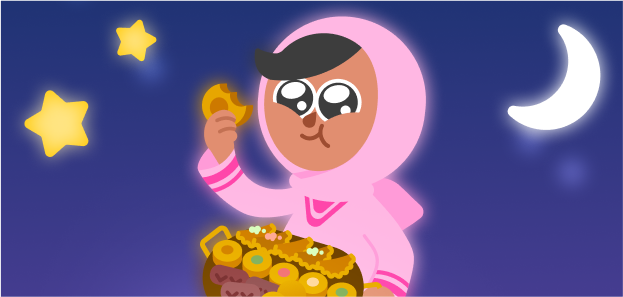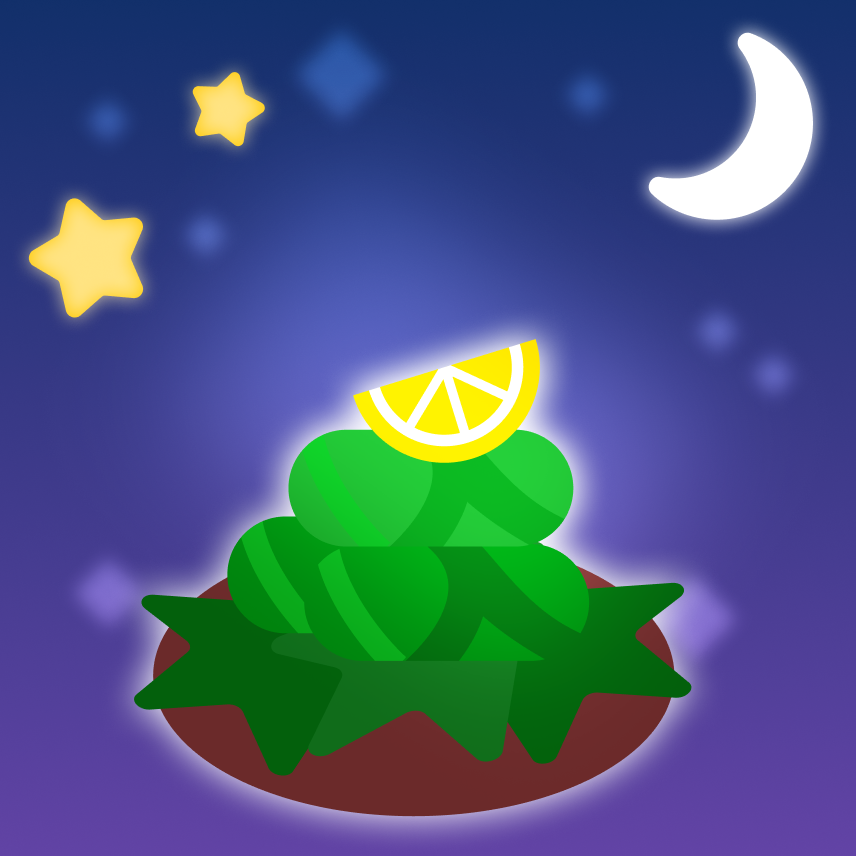Muslims around the world are observing the holy month of Ramadan—a time of self-discipline and character-building that includes abstaining from food and drink, from sunrise to sunset, to create empathy for those less fortunate who do not have access to food. Breaking the day-long fast is also central to Ramadan traditions, and while the significance of the celebrations is shared by the 1.8 billion Muslims worldwide, how people break their fasts represents each community's unique combination of religious, regional, and culinary traditions.
Here's the most important—and delicious—vocabulary about Ramadan!
The language of Ramadan
While Muslims around the world speak many different languages, Arabic holds a special place as the language of the Quran and other religious texts like the hadith, and it's used in religious services and prayers. There is quite a lot of diversity in Arabic dialects of North Africa and the Middle East, but many of the most important Arabic words about Ramadan are the same around the world, due to their significance in these deep-rooted religious traditions.
Here are the most important Arabic words to know for Ramadan:
Ramadan food vocabulary: the basics
- إفطار (iftar, "breakfast"): This is the name of the meal Muslims share at sunset during Ramadan, when they break their fast. Iftar is used in the context of breaking the Ramadan fast in particular, but its origin is related to فطور (futur), the general word for “breakfast.”
- سحور (sahur, “last meal before daybreak during the month of Ramadan”): This meal, more commonly pronounced "s.hur," is the meal many Muslims share before dawn, when they begin the next day's fast. This word is related to the Arabic word for "dawn," سَحَر (sahar)!
What to say to Muslims celebrating Ramadan
- رمضان مبارك (ramadan mubarak, "blessed Ramadan"): This is one of the holiday greetings for the season, and you'll hear a variant of الله يبارك فيك (allah yubarik fik, “God bless you”) in response.
- رمضان كريم (ramadan karim, “generous Ramadan”): This is another common holiday greeting, along with its response الله أكرم (allahu akram, “God is more generous”).
If you're with your Muslim friends when they have their iftar or sahur, you can also wish them "bon appétit" in Arabic! (This is the same expression used around meals outside of Ramadan as well.) The exact phrase varies a lot depending on the region—here are a few options:
- صحتين (sahten, “two healths”) in the Levant (for example, in Lebanon and Syria)
- بالهنا والشفا (bil-hana we sh-shifa, “in good health and healing”) in Egypt
- بالصحة (bs-sha, “in health”) in Morocco
More Arabic words especially for Ramadan!
To wake everyone up for sahur, the meal before dawn, many communities used to have a مسحر (musahhar) or مسحراتي (musahharati): The musahhar is a man who walks around town beating a drum to wake you up for sahur. The musahhar usually dresses in traditional clothing and recites set phrases like "Get up for your sahur!" and "Profess God's unity!" Because he's a member of the community too, he probably also knows many people in the neighborhood and might call out their names while he beats his drum!
In Arabic-speaking countries, everyone knows that the best TV series of the year come out during Ramadan—the beloved مسلسل (musalsal, “soap opera”)! Each night of the holy month of Ramadan, a new episode airs. This tradition is clearly much newer than that of the musahhar, but it's a cultural phenomenon that you can't ignore!

The food of Ramadan
While much of the religious vocabulary is shared by Muslims around the world, the foods you'll find at iftar and sahur will vary by region and culinary tradition! Many choose to break their fast with dates to follow the example of the Prophet Muhammad as described in the hadith. Appetizers, like salads and dips, and dishes of all kinds (soups, rice, meats, and wonderful sauces) follow—and then incredible sweets. Special sweets for Ramadan are so important that you can expect extra traffic in the areas with sweet shops—for example, the Midan neighborhood of Damascus (Syria) is well-known for its sweets, and during pre-dawn sahur, the area is filled with bright lights and taxis trying to navigate the crowded streets!
There are many special Ramadan drinks, too, including تمر هندي (tamr hindi, “tamarind drink”), روح افزا (rooh afza, "fruit- and rose-flavored drink") and قمر الدين (qamar id-din, literally “moon of religion” but means “apricot drink”).
Here are some favorite Ramadan dishes from Muslims around the world:
| Fruit chaat Fruit chaat is a spruced-up version of fruit salad found commonly in Pakistan and India. It's the perfect blend of sweet and spicy, and it includes fruit with pepper, roasted cumin powder, kala namak (black salt), and chaat masala. Fruit chaat is a light way to to feel refreshed after a long day of fasting with a flavorful kick! |
 |
| Shorba At iftar time, some variation of shorba graces tables in many Middle Eastern and North African homes, including those in Lebanon, Palestine, and Algeria. Shorba is a nutritious lentil or multigrain soup that warms your body up for the other fried food at the table! |
 |
| Sambusa Called sambusas in the Middle East and Africa and samosas in South Asia, these are a staple of iftar for most Muslims. And what's not to love? Sambusas are deep fried bread stuffed with veggies and/or meat and spices, specifically designed to make your mouth water. In fact, there is no evidence to date that you can eat only one! |
 |
| Ramazan pidesi Ramazan pidesi is a common flatbread dish served in Turkey. In Turkish and Urdu, "Ramadan" is pronounced "Ramazan" and pidesi is related to the word "pita"! Ramazan pidesi can have different stuffings or toppings and is crispy on the outside and soft on the inside, with a delicious, nutty flavor from the sesame or nigella seeds. Although pide is served year round, Ramazan pidesi is special during the holy month and is a common staple of Turkish iftars. |
 |
| Warak enab Warak enab are stuffed grape leaves that you can find in the Middle East and even Armenia (where they are called dolmas). They’re usually filled with rice and veggies or rice and meat to create a savory treat. The toughest part of preparing this delicacy is the intricate folding of the leaves! Working together to fold the leaves of warak enab is a family tradition in many households. |
 |
| Onde onde In Malaysia and Indonesia, kuih (sweets) are a delicious iftar treat, and onde onde is a favorite: They're made from palm sugar, pandan (a grassy, vanilla flavor from a plant in Southeast Asia), and grated coconut. Similar to mochi from Japan, onde onde has a chewy outside texture with a soft filling called gula melaka. These little treats also come in many forms, from the traditional rice ball, to the newer doughnut and cupcake versions! |

|
Ramadan mubarak and bon appétit!
This Ramadan, let's celebrate how language and culture go hand-in-hand by joining Muslims worldwide as they break the fast using everyone's favorite language—food!
